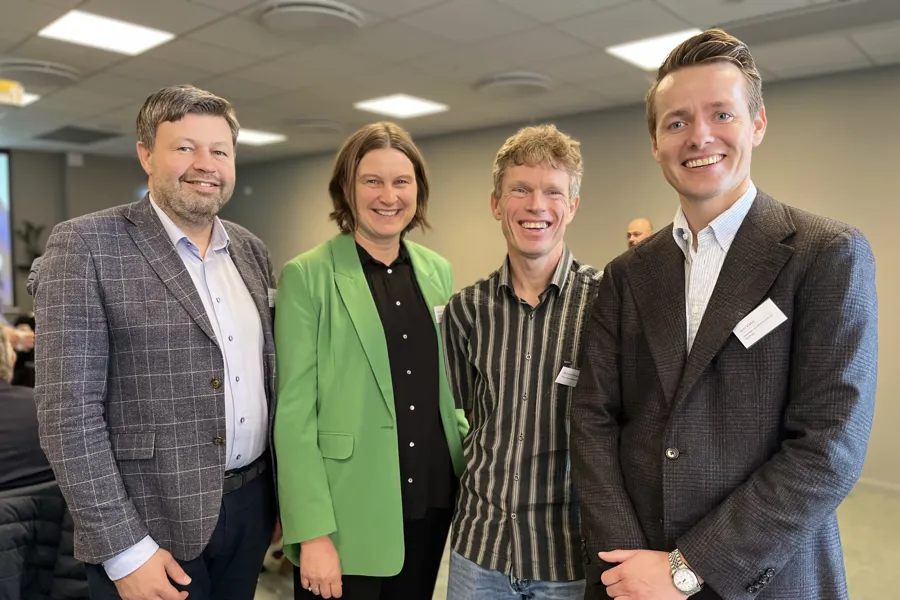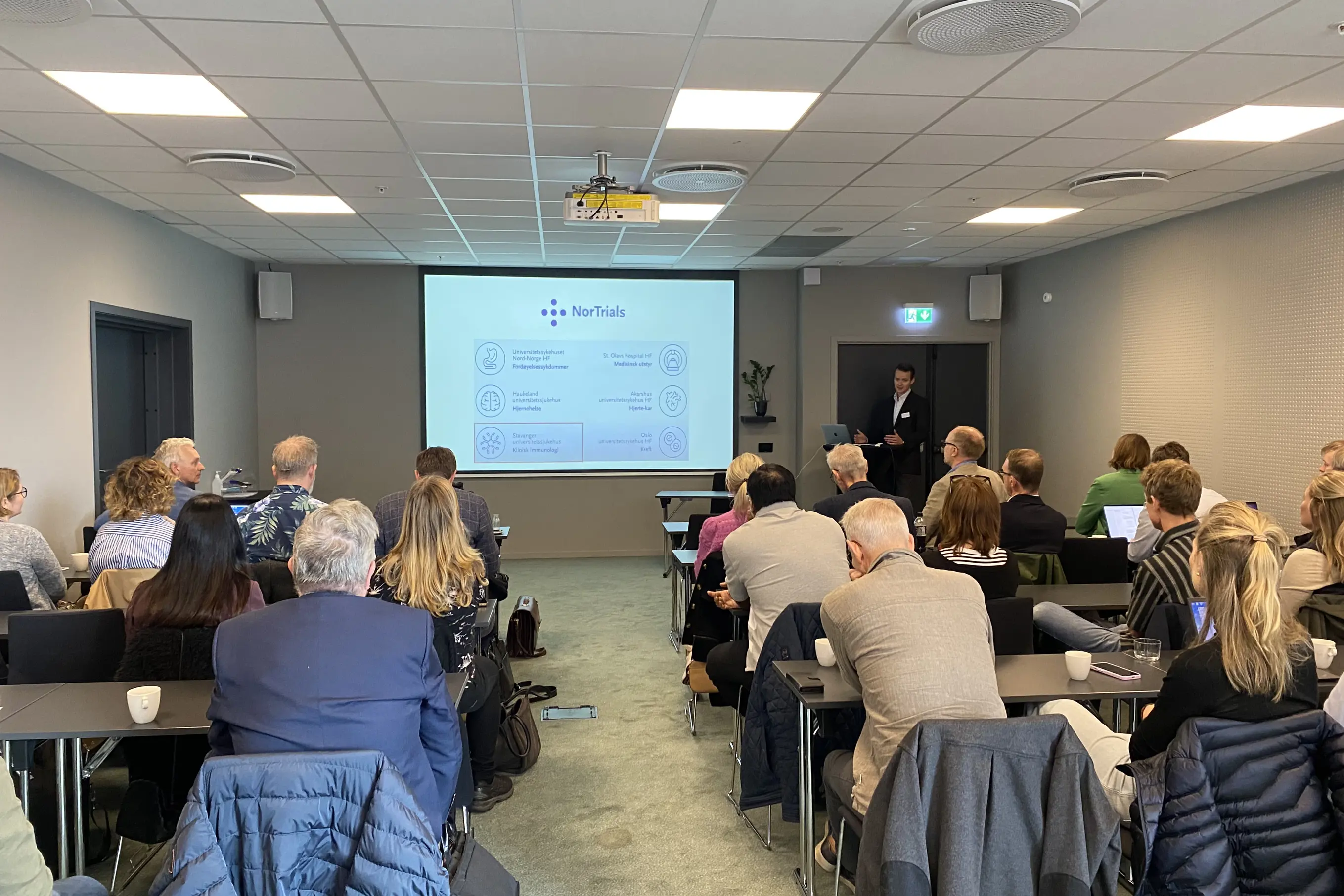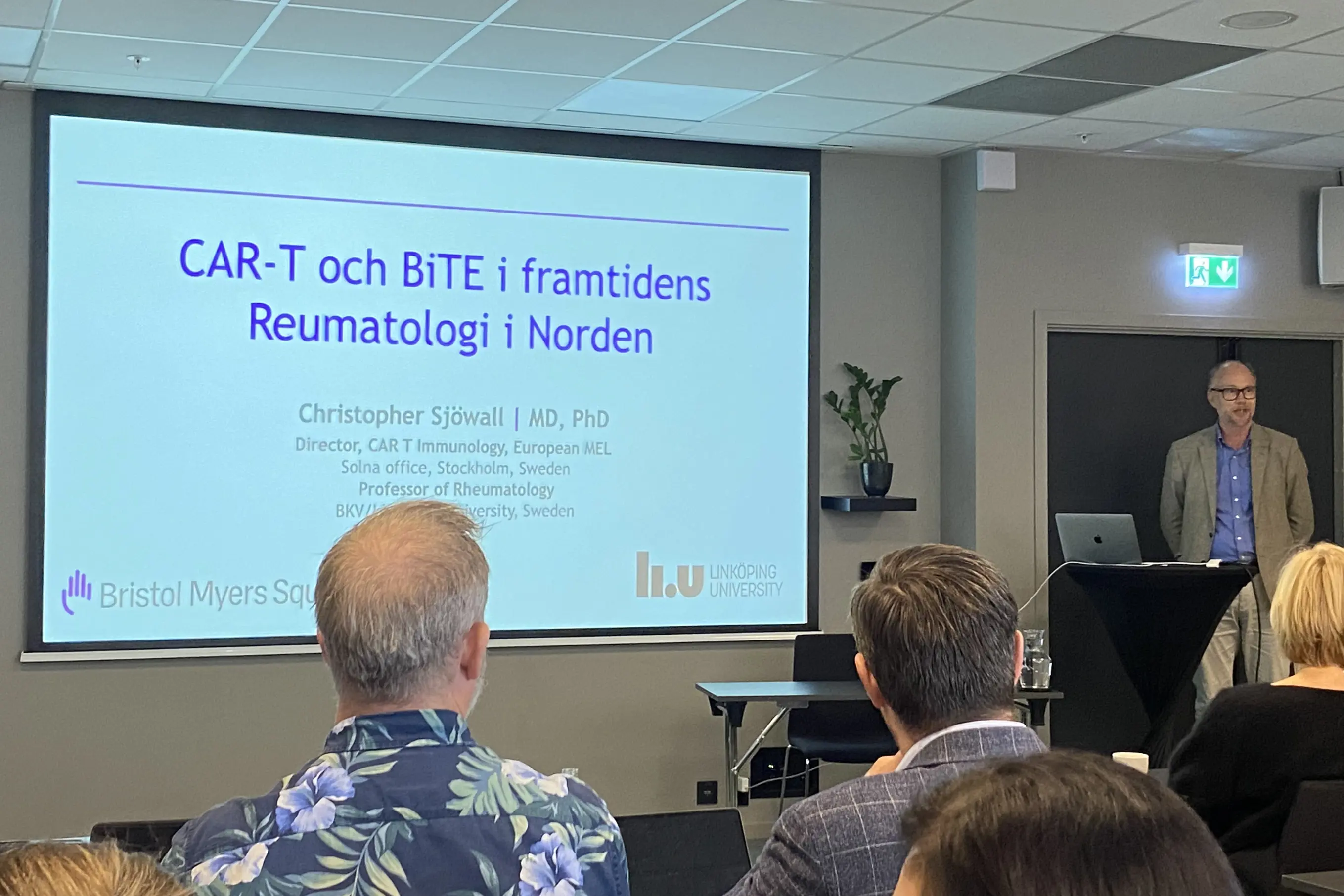National Strategy Meeting – CAR-T and BiTE Studies in Rheumatology
“Deep B-cell depletion with CAR-T cell therapy and bispecific antibodies (BiTEs) is the next big thing in the treatment of rheumatologic diseases and could become a revolution for this patient group. We must learn from the hematologists and bring such studies to Norway”. That’s according to Jens Vikse, center director for NorTrials Clinical Immunology.

On Monday, he gathered representatives from the Norwegian rheumatology community, a handful of hematologists, and several industry representatives for a full-day meeting in Oslo to discuss how they can work together to prepare Norway for conducting CAR-T and BiTE studies in rheumatology.
Vikse organized the meeting together with colleagues from the research center REMEDY (Research Center for Treatment in Rheumatology and Musculoskeletal Diseases), Oslo University Hospital (OUS), and the Norwegian Society of Rheumatology (NRF).
It was the first time these stakeholders were gathered with CAR-T and BiTE therapies as the main topic, and there was great enthusiasm and many questions from the approximately 40 participants.

What does this type of treatment involve?
CAR T-cell therapy is a type of immunotherapy that in recent years has been used to treat cancers caused by malignant B cells. The treatment principle involves first extracting the patient's own immune cells (T cells), then genetically modifying them in a laboratory so they can more effectively identify and destroy cancer cells. Finally, the genetically modified T cells are infused back into the patient to do their job.
Globally, more than 34,000 patients have been treated with CAR T-cell therapy, and as of today, the treatment is FDA-approved for six indications within lymphoma, myeloma, and leukemia.
BiTEs (Bispecific T-cell Engagers/bispecific antibodies) are another type of therapy that has been used in recent years in cancer treatment. BiTEs bind simultaneously to both cancer cells and immune cells (T cells), which activates the T cells to attack and destroy the cancer cells.
CAR-T and BiTE therapies can also eliminate B cells that drive autoimmune diseases. Early reports on the experimental use of CAR-T and BiTE have shown very promising results, giving hope that deep B-cell depletion could become a new treatment principle for certain rheumatic diseases.
Treatment with CAR-T and BiTE requires extensive planning, resources, expertise, equipment, and specialized facilities—so there are many criteria that must be met in order to be selected as a site for a clinical trial. Both hematologists and pharmaceutical companies are important collaborators, and among the questions discussed were:
- How can CAR-T/BiTE studies in rheumatology best be conducted in Norway?
- How can collaboration with hematologists be established and strengthened to support mutual success?
- How should feasibility requests from the industry regarding CAR-T/BiTE be managed and evaluated?
- How can Norway be promoted as an attractive trial country in this field?
Cell Therapy in the Nordics
Christopher Sjöwall, rheumatologist, professor at Linköping University, and European Director of CAR-T Immunology at BMS, spoke about the Nordic perspective on rheumatology and clinical studies involving CAR-T and BiTE. BMS currently has an ongoing phase 2 study using CAR-T therapy for patients with lupus (SLE), with Denmark participating through two sites.

Cell Therapy in Norway
Silje W. Syversen, head of the Norwegian Rheumatology Association, emphasized that the association is actively working to ensure that Norwegian rheumatologists have the best possible conditions to provide optimal patient care. This includes establishing and further developing collaboration with other specialties such as hematologists, as well as supporting industry-funded studies that provide Norwegian patients with access to experimental treatments.
At Oslo University Hospital (OUS), active efforts are underway to make CAR-T therapy available for patients with rheumatic diseases, including through participation in two Novartis-initiated phase 2 studies in SLE and ANCA-associated vasculitis, as well as the planning of an investigator-initiated study using locally produced CAR-T cells (led by Professor Øyvind Molberg).
The hospital also has a national focus on advanced therapies (Advanced Therapy Medicinal Products, ATMP) and has established a Center for Advanced Cell Therapy (ACT), which is intended to facilitate the development of ATMPs and make these treatments accessible to Norwegian patients.
Espen A. Haavardsholm gave participants further insight into what REMEDY has achieved with its funding from the Research Council of Norway. REMEDY is based at Diakonhjemmet Hospital and has, among other things, established a national clinical network with several ongoing investigator-initiated projects. They are now seeking to attract more industry-sponsored clinical trials.
The NorTrials Center for Clinical Immunology in Stavanger, led by Vikse, has a similar network of rheumatologists from across Norway, which largely collaborates with and overlaps with REMEDY.
Global network initiated by IQVIA
Tanya Partridge from IQVIA, the world’s largest contract research organization (CRO), spoke about their investment in cell and gene therapy through the establishment of the CAGT (Cell and Gene Therapy Site Network). This network consists of 230 sites worldwide, all of which have passed the stringent requirements to be approved for running this type of study. These centers are prioritized during the country selection process for clinical trial allocations.
To date, IQVIA has conducted 275 CAR-T studies involving over 12,000 patients across 70 countries.
Experiences from the hematologists and oncologists
Hematologists and oncologists have the most experience with CAR-T and BiTE therapies in Norway, which is why it was valuable for the rheumatologists to hear from Ingerid Weum Abrahamsen and Fredrik Schjesvold about their experiences in the field. They emphasized that close collaboration and efficient logistics are essential for success.
Novartis was the first pharmaceutical company with CAR-T experience in Norway, and as early as 2012, the Section for Experimental Cancer Treatment at the Radium Hospital was selected as one of six centers in Europe that the company partnered with to conduct a clinical trial of the therapy.
Tarje Bergdahl shared the story of five-year-old Emily Whitehead, who was the first patient in the world to receive CAR-T cell therapy for leukemia.
Both Novartis and AstraZeneca shared their experiences with cell therapies and gave some insight into what they have in the pipeline in the field of rheumatology. Both companies emphasized what is important for putting Norway on the map when it comes to study allocations from global companies. Many of the key points echoed those mentioned by Fredrik Schjesvold:
- Rapid recruitment of the agreed number of patients within the timelines set with the sponsor
- Deliver on promised enrollment numbers—failure to do so may result in losing opportunities for future studies
- Participation in phase II trials increases the likelihood of being included in further development during phase III
- Having recognized centers of excellence in the relevant therapeutic area is essential
- Presence at international conferences, participation in advisory boards, and regular meetings with decision-makers in the companies
"Don’t be afraid to be persistent! Persistence shows you're interested! That’s how we got our first CAR-T study to Norway," said Schjesvold.
The article was translated from Norwegian to English using ChatGPT and edited by Signe Fretland.